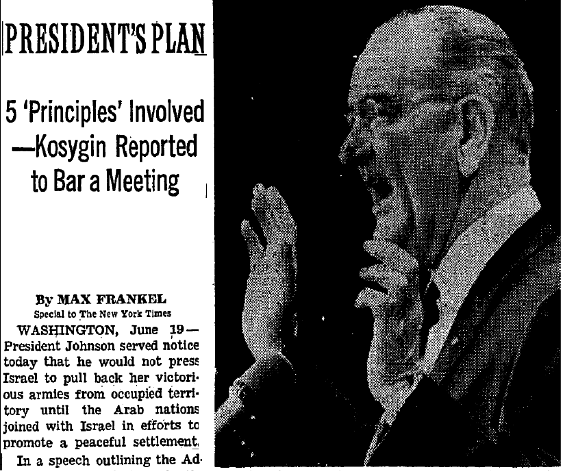President Lyndon Johnson Outlines Five Principles for Peace in Middle East

June 19, 1967
Speaking to a group of 800 educators at the State Department, President Lyndon Johnson delivered an important foreign policy address. The address touched on a number of subjects including the need for economic modernization in Latin America, limiting the spread of nuclear weapons, and issues of hunger and overpopulation in the developing world. Speaking nine days after the June 1967 Six-Day War, most of Johnson’s speech was devoted to the Middle East, and included five principles for peace in the region.
The five principles:
- All nations in the region have a right to live in peace.
- Justice for the refugees.
- Preservation of maritime rights.
- An end to the Middle East arms race.
- The need for recognizable borders.
Unlike the Eisenhower administration in 1956, the president did not call for Israeli withdrawal from recently conquered territories. Stressing that it is incumbent on the parties in the region to work together for peace, Johnson noted, “Clearly the parties to the conflict must be the parties to the peace. Sooner or later it is they who must make a settlement in the area. It is hard to see how it is possible for nations to live together in peace if they cannot learn to reason together.”
The same day that Johnson spoke at the State Department, Soviet Premier Alexei Kosygin delivered an address at the United Nations that demanded Israeli withdrawal from captured territories and the payment of reparations for war damages to Arab states.
Under Johnson, American economic aid to Israel increased to its highest levels since the formation of the state. Military aid increased with three significant arms packages in 1965, 1966 and 1968, including sale of the first American offensive weapons to Israel. Johnson had a especially strong relationship with Israeli Prime Minister Levi Eshkol. To read the complete speech, click here.